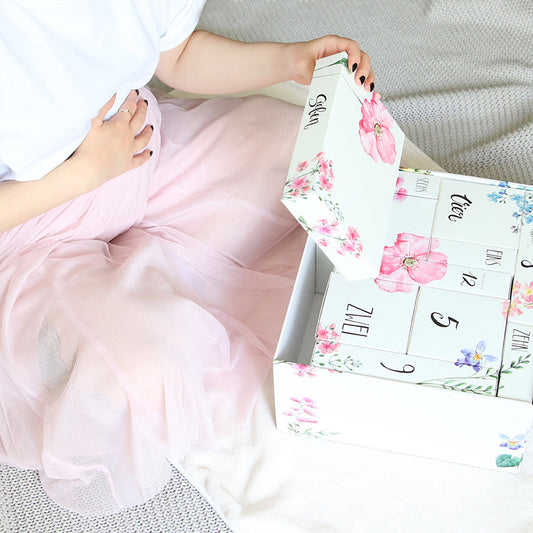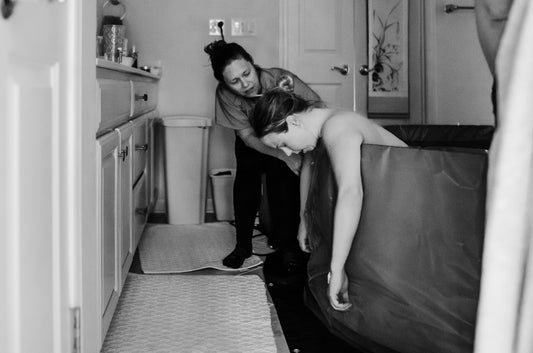Guest article by Julia Beroleit.
As a sleep coach for parents with babies, I am familiar with the following problem parents face:
The newborn does not sleep as the parents would like or expect, or as they need for their own health. Many people think they have to solve the issue of “baby sleep” on their own, or hope that it will sort itself out one day.
That can be the case, but most of the time it is not. Many parents only come to me when they are already quite desperate... What I advise them: It is never too early for advice or sleep coaching (but also never too late ;)
I hope that counseling on the subject of sleep will become as “everyday and normal” for parents as attending a birth preparation seminar, a postnatal exercise class or a solid feeding course.
Sleep coaching is not about training your baby to have a certain sleeping pattern or not, but rather about providing individual advice that takes into account various factors - such as the baby's age and development, the child's individual sleep needs - but also emotional elements, as well as the course of the pregnancy and birth.
This way, parents can relax a little on this topic right from the start, and that is the main thing when it comes to the topic of sleep.
Six facts that you should know about baby sleep during pregnancy to help you deal with the topic of sleep in the postpartum period in a more relaxed manner.
1. The first three months of life like in the womb
The first three months of a newborn's life are a very special time for many reasons. In fact, the new citizens of the world would like to extend the life they were used to for a good nine months in the womb to about another three months. For them, this means: alternating between short naps and longer naps, roughly equally distributed between day and night, lots of physical contact , as close as possible - so that they feel their physical limitations - alternating between rest and movement, not too many stimuli, but not necessarily complete silence either (there was quite a lot of noise in the womb), as well as frequent drinking and regular sucking to calm down.
2. Babies sleep a lot, but not all day
In the first few months, babies need between 16 and 18 hours of sleep. Babies are born with almost no day and night rhythm . This then develops step by step - from the 4th to 6th week of life (faster for some, slower for others) within the first 6 months - and so in the first few weeks or months the hours of sleep are often equally distributed between day and night, and then more and more at night and less during the day. The day and night rhythm develops naturally through life in their families through so-called "social zeitgebers" , which include loud and light during the day, dark and quiet at night, noises or putting on pajamas, daily rhythms when the children are older.
3. Why is sleep so important for infants?
Sleep is important for all people, but especially for infants and young children.
A sleep cycle , consisting of a deep sleep and a dream sleep phase (REM phase), lasts around 90 minutes for adults, but only 50 to 60 minutes for a newborn. This explains why babies sometimes wake up every hour at night. Babies also have many more dream sleep phases in which they process the impressions of the day. Accordingly, the brain and muscles are active and the whole organism is more receptive to waking stimuli. During deep sleep, growth hormones are produced and new body cells are formed. The immune system, which is always working, also regenerates itself during sleep.
"Brain hygiene" takes place in dream sleep - everything that is learned, experienced and perceived during the day is processed and sorted by the thinking center during dream sleep. Motor learning experiences are processed in deep sleep, emotional and mental experiences in dream sleep, also known as REM sleep. Babies spend around 50% of the night in REM sleep - in contrast to us adults, we have a share of around 20%. Babies move a lot in their sleep, this can be in dream sleep and then in a light sleep phase. Dream sleep is an important phase for the learning process and stimulus processing and that is why regular sleep during the day is so important for babies and toddlers.
4. Learn to “read” your baby’s tiredness signs
Make sure that your newborn is not awake for too long at a time, otherwise it could quickly become overstimulated. If a baby does not get enough sleep and does not sleep regularly, it can be very stressful for the child and therefore also for the parents. The fact is that most newborns and babies do not simply fall asleep when they are tired, but need help to get to sleep in a relaxed manner. The challenge:
Infants often do not reliably show that they are tired. There are the classic signs of tiredness such as:
-
Eye rubbing
-
absent look
-
Rubbing ears
-
Put your finger in your mouth
- whining, complaining / restlessness
This is often coupled with breastfeeding/drinking. Breastfeeding to sleep is a completely natural and wonderful way to help your baby fall asleep in the first few months, and parents shouldn't stress about getting used to it.
5. Drinking frequently is completely normal
The baby's small stomach grows from the size of a cherry to the size of an egg within the first month. Newborns initially take in smaller amounts of milk and want to drink more often (approximately every 1.5 - 2 hours), even at night.
The reason why babies sleep so lightly and with such short cycles is to enable them to drink . Breastfed babies often wake up, especially at night, because breast milk is digested quickly and the baby needs to drink very regularly in the first few months to accommodate its enormous growth . Babies who are bottle fed also wake up after each sleep cycle, but many parents do not always give the bottle, but give their baby another way to help them get back to sleep.
6. Where little babies sleep
In mom or dad's arms or on their stomach would probably be at the top of the list of mini-babies when it comes to their favorite place to sleep . This is great for both sides, at least for the first three months, as it is the best way to get to know each other and to extend the bonding lovingly. However, as this is not permanently practical day and night, alternatives for the day are: carrying (day wrap/carrying systems), strollers, bassinets, special mattresses such as CoocoonABaby, hammocks or nests made from nursing pillows. For the night, the options are side beds, normal children's beds or co-sleeping - in other words in the mom/dad bed. How you want to handle this is something you can and should decide on your own as a family or as parents. The most important thing is that everyone gets enough and sufficient sleep and that the general rules for safe children's sleep are observed.
My tip for new parents on the subject of sleep would be:
In the first few weeks, spend a lot of time in bed or on the sofa to rest, try to regularly create a place for the baby and for you to sleep, and don't let outside influences and others unsettle you. In the beginning, you can do anything that is good for you and your baby! What you should be careful about is not doing too much, including when calming the baby. A good guideline could be to rock, cradle and bounce the baby (which babies love and need) to calm them down, just as they are used to from the womb, but not much more.
Sleeping is an emotional topic, but there's no reason to drive yourself crazy or be ashamed - get help if you need it .
My experience is that every family has its own personal way of dealing with the issue of sleep.
All the best and a wonderful start is the wish of sleep coach Julia Beroleit from Cosy Eleven
about the author





























